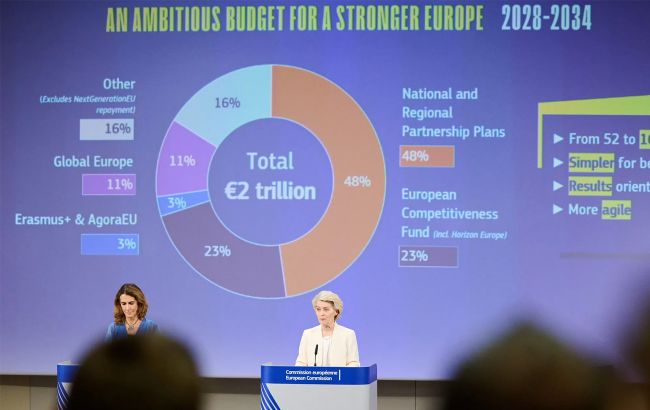The German government has rejected the European Commission’s proposed long-term budget framework for 2028–2034, amounting to €1.98 trillion. The decision came just hours after Commission President Ursula von der Leyen officially presented the plan in Brussels – G.Business reports, citing Bloomberg.
A government spokesperson stated:
"An extensive expansion of the EU budget is unacceptable at a time when all member states are working to consolidate their national finances."
Germany, traditionally the EU’s largest net contributor, made clear it cannot support the proposal in its current form.
This position from Berlin signals significant hurdles ahead, as the multiannual financial framework (MFF) requires unanimous approval from all 27 member states and the European Parliament.
What Does the New Budget Proposal Include
The European Commission presented the draft on the evening of July 16 after intensive internal negotiations. The seven-year financial plan is set to run from 2028 to 2034.
Total Volume: €1.98 Trillion
This represents a substantial increase from the current MFF of approximately €1.2 trillion. According to the Commission, the larger budget is necessary in response to mounting geopolitical tensions, economic restructuring, security concerns, and the continued support for Ukraine.
One of the major pillars is a newly proposed “Competitiveness, Prosperity and Security Fund” amounting to €590 billion, including €451 billion earmarked for supporting European businesses.
€100 Billion in Aid for Ukraine
A cornerstone of the new financial plan is €100 billion in funding for Ukraine, allocated for post-war reconstruction, resilience, and long-term EU integration.
While Brussels views this as a strategic investment in European security and stability, the aid package is expected to be a divisive issue among member states.
Agricultural Budget to Be Cut
To free up resources for new priorities, the Commission plans to reduce the Common Agricultural Policy (CAP) budget. Direct payments to farmers are expected to fall from €387 billion to €300 billion.
Von der Leyen emphasized that agriculture will remain a key budgetary area but needs to be restructured for sustainability. Countries with large agricultural sectors – such as France, Poland, and Spain – have already voiced strong concerns.
Fiscal Discipline and Political Resistance
European Parliament President Roberta Metsola stressed the importance of transparency and oversight:
"Fiscal discipline is not optional – it is a duty."
She promised strict controls over how funds are allocated and spent.
At the same time, former ECB President Mario Draghi pointed to an annual investment gap of €800 billion within the EU. The proposed budget is seen as a necessary tool to close this economic shortfall.
Tough Negotiations Ahead
The Commission must secure unanimous approval from all member states and the European Parliament by the end of 2027. With tensions over defense spending, Ukraine aid, agricultural cuts, and rising national contributions, the process is likely to be highly contentious.
A separate debate has emerged around whether EU funds should be used to purchase U.S.-made weapons for Ukraine. EU Commissioner for Defense, Andrius Kubilius, clarified that:
"The EU budget cannot be used to finance the purchase of American arms for Ukraine."
Stay connected for news that works — timely, factual, and free from opinion. Learn more about this topic and related developments here: Grape Stomping in Europe and Germany 2025: Where You Can Join the Tradition
